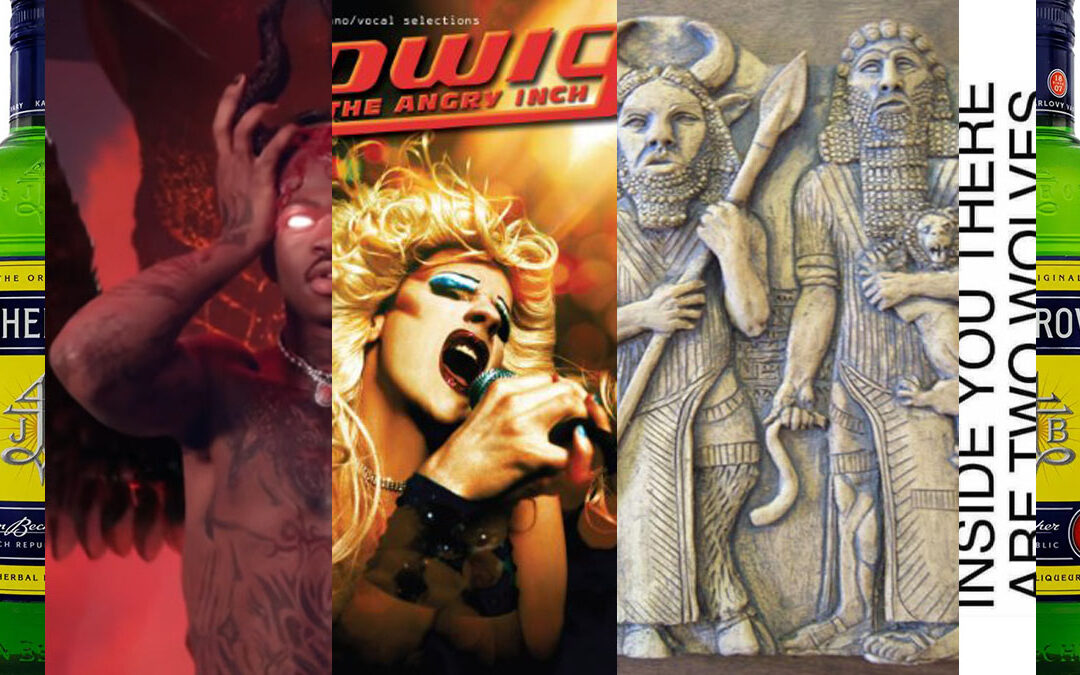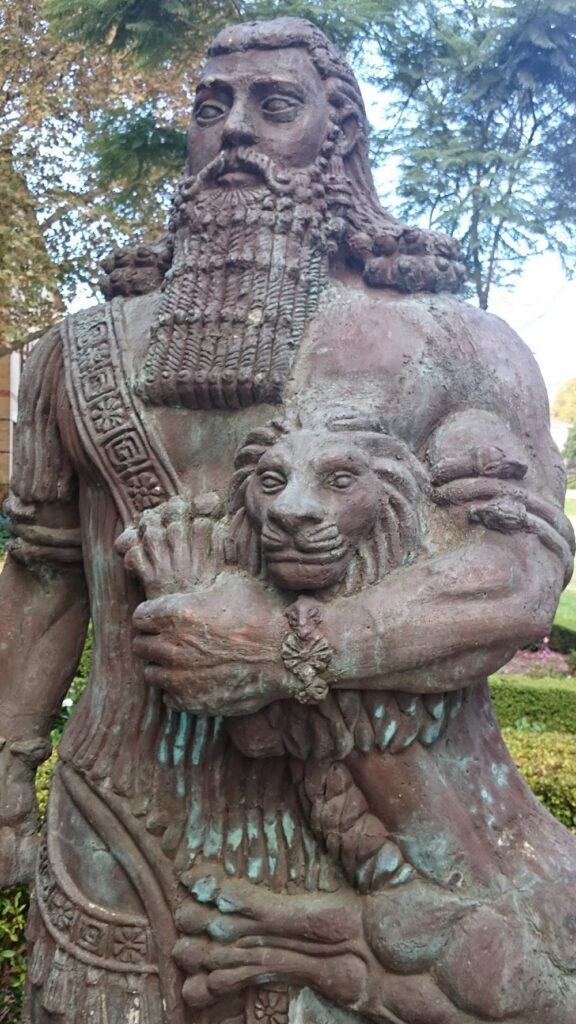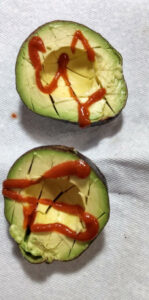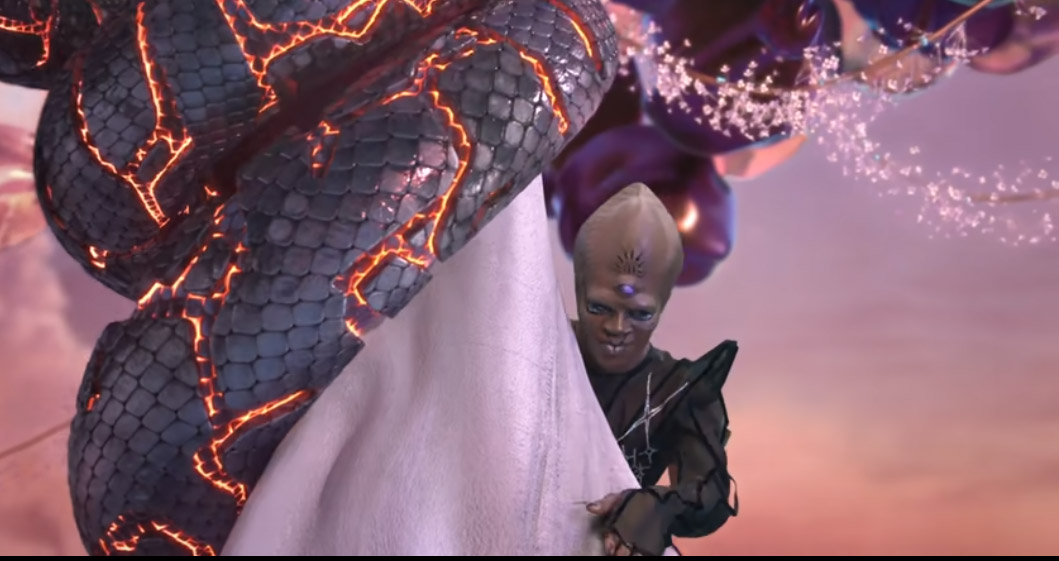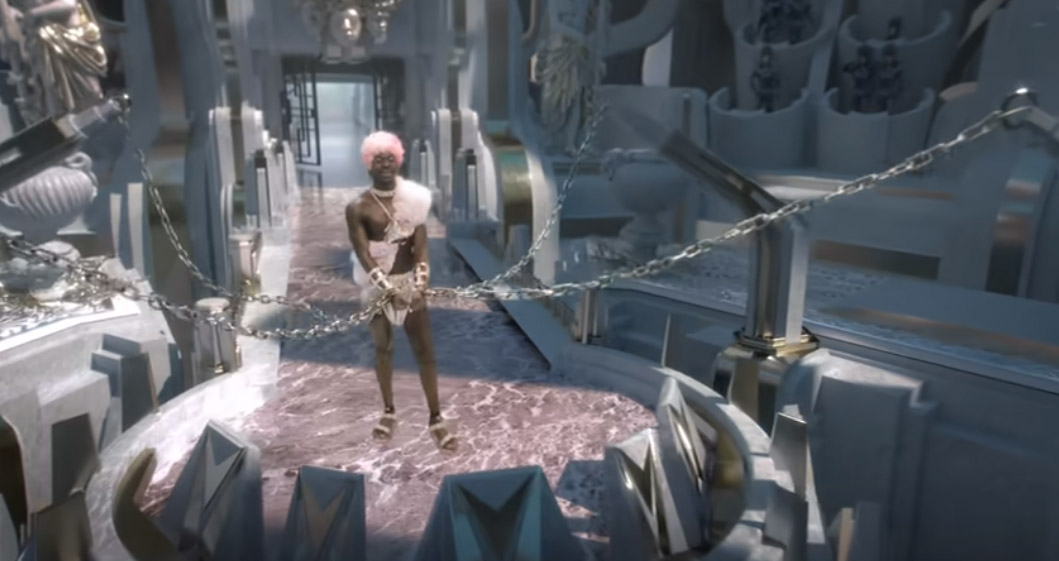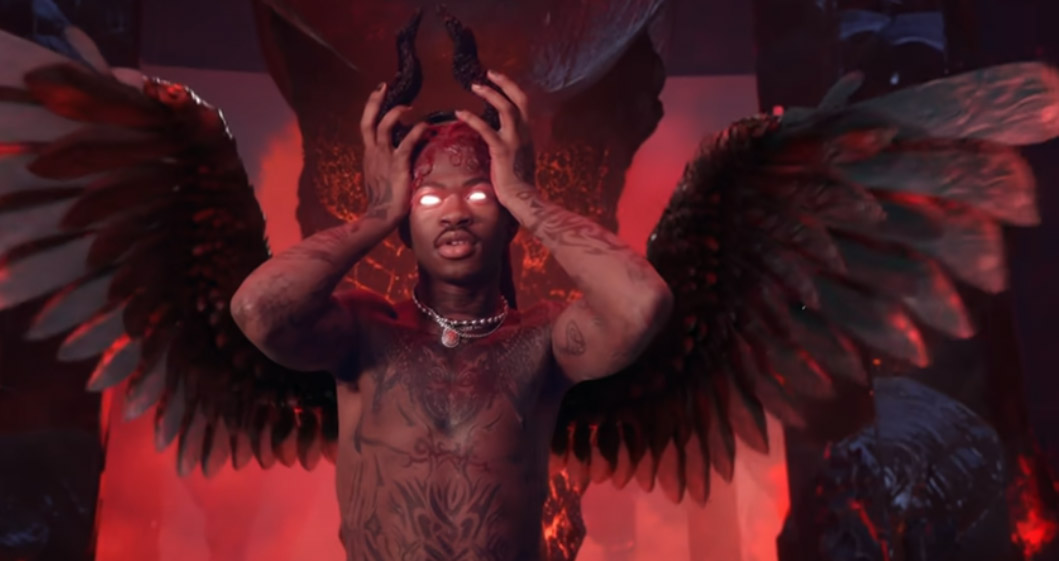
Whew! Wrapping up four episodes on Mesopotamia, which was about twice as many as we thought we’d do originally. Hope they were fun! They may have deviated a bit from the central nub of the podcast, but we wanted to get a firm handle on the mythology that underpins…well…pretty much all mythology. And you couldn’t talk about Mesopotamia without talking about Gilgamesh and Enkidu.
But we’ll start with some drinks. Like the Lonesome Hero, a complex drink for a complex character. With notes of cough syrup, herbals, possibly the grassy steppes, and a twist of lemon, we’re pretty sure this is exactly what the hero’s journey tastes like. Jacob ponders the existence of an “antihero,” which may be a similar, complex and herbal drink, but with more tequila. Jamin invites you to douse your avocado with sriracha.
Today we are all over the place with Lil Nas X’s “Call Me By Your Name.” There is so much here to play with in terms of mythology, messaging, representation, LGBTQ issues….It oculd eat half an episode, no doubt. We started with this Time article on Historians decoding the video’s symbolism. Jacob hit a stumbling block with the “trial scene,” thinking it was probably a Jesus/Pilate moment, but Time suggests that it could represent the broad category of Christian martyrs who were stoned to death, metaphorically at the Colosseum. Glance over the article, there’s no need to list everything, except that he got that one wrong and is writing this paragraph and wanted to make amends.
Jacob was very happy about the appearance of Buer, president of Hell and #10 in the Goetia. And thinks that a LOT of people are unnecessarily fond of Buer, because he’s weird. Anyway, Buer appeared on the box of Li’l Nas X’s satanic tennies. If you’re reading this as a time traveller from the distant future, 1) welcome, but you could have done better; 2) the story is that musician Li’l Nas bought 666 pairs of Nike shoes, gussied them up with a pentagram and, allegedly, a very small amount of human blood, and sold them for $1018 dollars (referencing Luke 10:18:
The seventy-two returned with joy and said, “Lord, even the demons submit to us in your name.”
He replied, “I saw Satan fall like lightning from heaven. I have given you authority to trample on snakes and scorpions and to overcome all the power of the enemy; nothing will harm you. However, do not rejoice that the spirits submit to you, but rejoice that your names are written in heaven.”

A strange digression follows, in which the hosts argue about the Hero’s Journey, a hero’s journey, and whether or not Li’l Nas X’s video suggests one. Maybe? Looking back at the range of tropes that might turn up in the traditional “separation-initiation-return” model of the Campbellian Hero’s Journey structure–think Luke Skywalker, who leaves his home planet, goes into the swamps of Degoba, and returns with lost wisdom. Jacob thinks that there’s a lot of separation and initiation, but not enough “return” to complete the cyclic nature of the Joseph Campbell structure. Am I being too micro? Possibly. But it’s also hard to reference myth without nodding to elements of this structure, which, as you can see from this helpful infographic, is tropetastic.
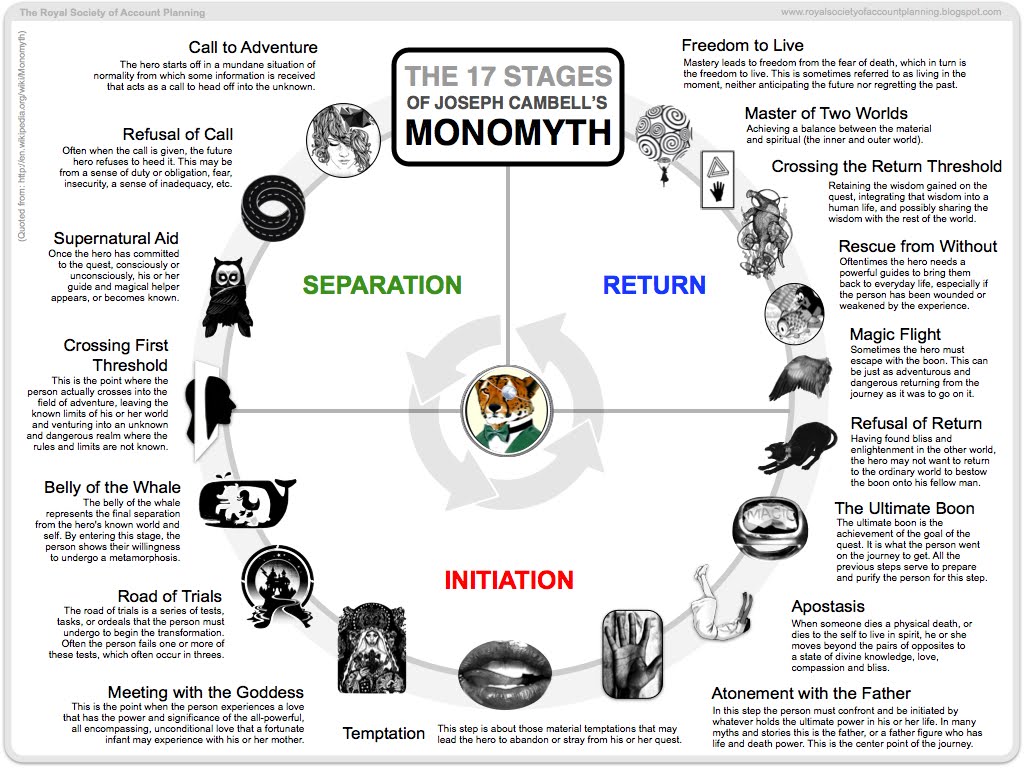
I suspect that we’ll eventually do an episode on Punch and Judy, in which The Devil is something of a recurring character. Sometimes the Devil wins, but usually Punch triumphs over the master of evil, in what is arguably the ultimate underdog victory. In particular, Jacob was reading Christopher Reilly’s “Tragical Comedy of Punch and Judy,” which is both amusing and short and goes through most of the major “plot” points of the full-spectrum Punch and Judy experience.

Pazuzu, Enazu, and Dingirs
Cuneiform has a punctuation mark that means, effectively, “yes, this is a god.” Interesting. Jamin’s journey of discovery is on the Dispatchist blog now!
Gilgamesh in not quite five minutes or less
Except for tablet 12, which is weirdly hard to find, we started with the ancienttexts.org translation of Gilgamesh. Enjoy it with the kids. If you like, open up TV Trope’s treatment of this one as well, it’s like a drinking game but with thick, wheaty beer.
Tablet 1
In which we establish the main character and the problem. The poet (unnamed) talks about the fabulous city of Uruk, giving us a nice concise wiki description of possibly the world’s first city, and then introduces its kng, Gilgamesh: Amazing, 2/3-god, explorer and adventurer, and kind of a despot, with no regard for the lives of his subjects (his taking each bride on their wedding night comes up a LOT, and it should.)
So the gods hear the prayers of the people and make a new demigod, to calm Gil’s heart. This is Enkidu, and he’s kind of a wild man. A local trapper finds him living with the gazelles, drinking from the watering holes, and being a nuisance by setting his trapped animals free.
The hunter sends his father to Uruk to ask for help in calming this weird nature-boy, requesting the temple prostitute Shamhat (“The Luscious One“) to tame this hairy, beautiful nuisance.
They really must hold sex workers in some high regard, if they’d call Shamhat in for something like a hostage negotiation situation.
Sex scene and civilization montage follow. It’s a bit like that old movie, “Walk Like a Man,” but with a week-long sex scene. So nothing like “Walk Like a Man.” Quite a lot of clay was scratched on how Enkidu is tamed, enobled, both enriched and reduced, and how very pretty he’s becom in the process.
Meanwhile Gilgamesh dreams about an asteroid from the heavens that he will “embrace as a wife” and “made him complete.” If anyone says there isn’t gay subtext there…the LGBT History Project has a very good article about the linguistic subtext here. which mentions the similarity between the words for “axe” and “meteorite” used to describe this gift from heaven and a few words for male religious sex workers. Thus Jacob’s endless “man-whore” jokes. Funny once, sir.
Tablet 2
The Meet-Cute. Shamhat wraps Enkidu up in a piece of her clothing (sort of a sarong?) and takes him to Uruk, or at least the farming community outside Uruk. The people are impressed by his strength and hotness, and a party is held, in which beer is liberally sloshed…another fine product of civilization. Enkidu begins his new life in the farming community, chasing lions away from the livestock. At least until he learns about the fundamental assholery of Gilgamesh and his massive “droit du seigneur” addiction. When he’s invited to a wedding, he lurks outside the couple’s bedchamber and throws himself at Gilgamesh.
A very manly wrestling match follows, after which the two kiss and make up, realizing perhaps that they’re bro-mates. They very quickly start talking about their first adventure, which will be cutting down the cedar of the sacred forest to the north which is not to be cut down, and killing the guardian of the forest, Humbaba, who was placed there by the gods to protect the sacred forest. Everyone says this is the worst possible idea, and Gilgamesh makes a very strong show of listening and nodding.
Tablet 3
Now the two bold heroes sally forth on an ill-advised quest, and may the gods and the people put their favor in them both. Also this is a terrible idea. There is much semi-ritualized wailing on the part of various mother-figures. We know how this is going to end, since it started in hubris.
Tablet 4
This gets a little mystical: Gilgamesh turns to dreams for inspiration on how to defeat the great demon, Humbaba. You really get a sense for how much the ancients relied on cut-and-paste with this one.
Tablet 5
There is some serious demonic monologuing here as Humbaba first taunts, then wheedles. Ultimately G and E go full lumberjack on him and cut down Humbaba and the cedar. Epic heroes 1, sustainability 0.
Tablet 6
We’re into the very sad bridge on tablet VI: G and E return to Uruk, home of the very, very jealous and very, very powerful goddess, Ishtaar. When Ishtaar sees triumphant Gil she offers him her hand in marriage, and a half-dozen perks besides, but Gil points out that every one of her suiters and husbands has had a rough time of it, real “Henry the 8th” stuff here. She calls up the “Bull of Heaven” to take Gilgamesh down, and this may well be her brother-in-law, husband to the goddess Erishkigal, it’s a bit ambiguous. The battle’s a whole new flavor of epic, but Enkidu is absolutely brilliant and taunts Ishtaar, throwing the “thigh” of the bull at her (is it thigh? Is it penis? You be the judge.)
Tablet 7
Hello, heroes, Hubris here. Having taunted the gods, fairly quickly after desecrating their holy site, there’s going to be some kind of cum-uppance. Enkidu falls ill, and there’s some boilerplate poetry copied out of the Descent of Inanna about the living conditions in the Underworld. Enkidu dies alone.
Tablet 8
(insert mourning montage here)
Tablet 9
Part 2: Gilgamesh confronts his midlife crisis. Suddenly aware of his own mortality, he goes looking for a cure for that condition. Scorpion people are fought, impenetrable darknesses are braved.
Tablet 10
A quiet and reflective scene: We meet the goddess Siduri, brewer and divine bartender, who lives by the sea and dispenses sage wisdom and carpe diems. However, Gil is hopelessly epic and cannot be disuaded, he goes to find Urshanabi, the Mesopotamian Charon. You may want to know what the “stone things” are. WE DON’T KNOW. Urshanabi has them, they help run his boat, Gilgamesh destroys them for no really plain reason, the boat doesn’t go. Golems? Warp nacells? We just don’t have a clue. Google for “Urshanabi Stone Things”, no one knows. We’re not even going to discuss urnu-snakes. There are so many mysteries here.
Tablet 11
We’re wrapping this one up soon, you can tell…there’s a flashback to the story of Utnapishtim/Noah, the only human to ever become immortal. There’s a few comical moments in this scene, immortality seems within Gil’s grasp, if only he could stay awake for seven days, or find a flower of immortality at the bottom of the lake. But he can’t stay awake, and a snake steals his magic flower. So, he returns to Uruk, and the story comes full circle, the greatness of Uruk will be Gilgamesh’s legacy.
Tablet 12
Tablet 12 may not be canon? It’s hard to say. It reads like three pieces of tacked-on fan-fic by different authors. Thanks to Wolkstein and Kramer for the translation. It lifts heavily from an older story, beginning with “The Huluppu Tree,” wherin Ishtaar has a lovely tree in her garden, but it’s infested with monsters, or birds, or Lilith. Unsure.
Inanna calls her brother (!) Gilgamesh over, asking for him to get rid of the weird animals in her tree. He does, and scares off the bird, the lilith, and a serpent (?), and then cuts the tree down to make some furniture for Inanna, and Inanna makes some fun toys for Gilgamesh.
A fair amount of ink has been spilled on what the hell a mikku and pukku are. I’m enjoying the theory that they’re literally toys, parts of a board game or sporting equipment.
Tablet 12 goes over a lot of earlier material, but with an odd comic tone: once again, Gilgamesh oppresses the people of Uruk with his obsessive (drumming, gaming, self-pollution, whatever you do with a pukku). Somehow, probably because of gods, he loses his thingies in the underworld, and Enkidu…poor, doomed twink Enkidu…has to go get them. If he obeys some simple rules he might escape, but no, no one escapes, and Enkidu is captured by the netherworld.
Predictably, the LGBT History Project would like you to know about the gay subtext in this scene. At some point the powers of the underworld let Gilgamesh have a sit-down with Enkidu, and they talk about how endlessly dull and bleak the world of the dead is (unless you have lots of kids, of course, but I don’t think Enkidu ever does.) Some readers suggest this passage is a lament of the pleasures that Gilgamesh will lose after death. Others suggest that it’s a sad goodbye between lovers. The jury is out.
If you really like Mesopotamian Gilgamesh fanfic, there’s also something like a lament for “Lord Gilgamechas,” but it doesn’t really give much closure.
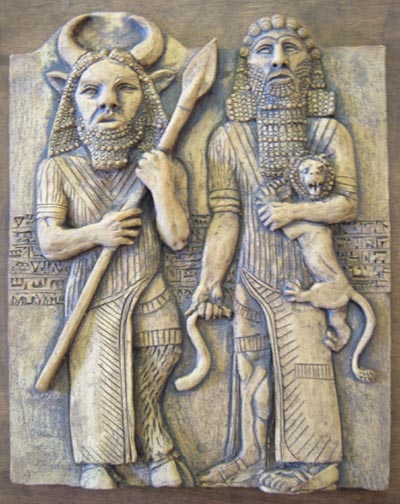
Plato’s Symposium
Between attempting to queer Gilgamesh and rewatching Li’l Nas’s “Call Me By Your Name”, we’ve dropped several references to Plato’s Symposium, but not very well.
The frame narrative for Symposium: Socrates and friends are at a fancy philosophy party, giving a series of ad-libbed speeches inspired by Eros, broadly, the spirit of love. One of the speeches is (at least in the context of this narrative) given by Aristophanes, who has delivered up an awful lot of extremely bawdy satire over the years, so take this with a grain of salt: humans were once two entities joined in one body, but this made them too much of a threat to the gods, so they were divided.
Any lines delivered by a fictionalized version of Aristophanes…well, this is regarded as one of Plato’s best “bits,” though is it a commentary on myth, a eulogy of love, a commentary on gender and the tragic state of mankind? None of the above? Is it just humor? It’s hard to say, but it is a strong meditation on the search for love, regardless.
Hedwig and the Angry Inch is a dark comedy on gender, struggling to find love and find one’s self. It’s amazingly strong and very gender-queer. Aristophanes’s speech is kind of the cornerstone of Hedwig (see the cartoon from the movie), and is dropped as a reference in the form of golden letters burned into a tree in Montero/Call Me By Your Name, which is, also, very queer and loaded with smart references.

Gilgamesh and Ecclesiastes
If you just enjoy rabbit-holing, and who doesn’t, here’s a fun “little” 280-page epic that talks about connections between the story of Utnapishtim and the story of Noah. In fairness, it’s really only a hundred pages or so, much of the essay is taken up with a translation of “Gilgamesh.” Still, good times. Jamin briefly talks about a possible connection between Gilgamesh and The Book of Enoch/Book of Giants: Giants/Enoch lists several of the half-divine giants (I think these are the nephalim – Jacob) killed in the flood, which among their rankes include “Gilgamesh” and “Hobabish”, possibly derived from Humbaba. Other authors note parallels between Enkidu and Nebuchadnezzar, but also that there’s some connections so strong between Sidhuri’s speech in tablet 10 and the book of Ecclesiastes that it seems likely the later book draws inspiration from Gilgamesh.
You, Gilgamesh, let your belly be full,
Keep enjoying yourself, day and night!
Every day, make merry,
dance and play day and night!
Let your clothes be clean!
Let your head be washed, may you be bathed in water.
Gaze on the little one who holds your hand,
Let a wife enjoy your repeated embrace,
Such is the destiny of mortal men. – Sidhari
7 Go, eat your bread with enjoyment, and drink your wine with a merry heart; for God has long ago approved what you do. 8 Let your garments always be white; do not let oil be lacking on your head. 9 Enjoy life with the wife whom you love, all the days of your vain life that are given you under the sun, because that is your portion in life and in your toil at which you toil under the sun (Ecclesiastes 9: 7-9).
Podcast: Play in new window | Download

